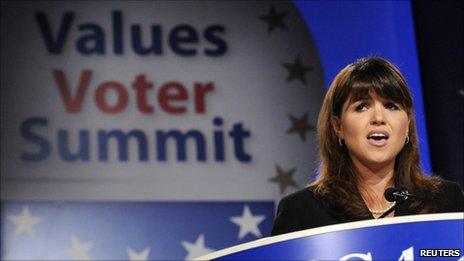'Conservative' America broadens agenda
- Published

Senate candidate Christine O'Donnell - who was backed by Sarah Palin and the Tea Party - was a crowd favourite at the Values Voter Summit
Conservatives in America are spending most of their time talking about fiscal discipline these days. But that does not mean they have checked their social agenda at the door.
The Values Voter Summit, an annual convention of social and religious conservatives in Washington DC, is usually focused on the perceived social ills of single parenthood, government welfare programs, and, most importantly, abortion.
But this year, with the help of the Tea Party movement, these conservatives have coalesced around the economy and fiscal discipline as their causes du jour.
Restraining government spending and repealing the recently passed health-care law joined abortion, stem-cell research and gay marriage as the biggest applause lines at the summit.
And the movement has a new generation of heroines - Sarah Palin, Congresswoman Michele Bachmann, and, the most recent addition, Delaware Senate candidate Christine O'Donnell - injecting folksy talk of good ol' American values into their economic beliefs.
Economy as a moral value
Since the recession, debates around debt, taxes and spending have increasingly becoming the way many US conservatives express their social values.
Opinions about issues such as the bailouts for banks and car companies have become an extension of their belief in god, family and what it means to be American.
Ms Bachmann, for example, told the Values Voter that the financial woes of American auto companies - which she says were the result of too-generous pension plans - are an example of contravening a basic Christian principle: "Thou shalt not covet what does not belong to us."
Ronald Reagan's famous declaration that government is not the solution to America's problems but rather is the problem itself echoes, unspoken, through the cavernous hall.
"The size and scope of government is directly related to the virtue of people," Rick Santorum, a former senator and potential 2012 presidential candidate, said in his speech.
In poor communities, Mr Santorum said, you will see few traditional families but government services will be everywhere.
"Without faith, family, and virtue, government takes over," Mr Santorum claimed. "Limited government can only occur in a society where there are strong families, strong churches, and virtue."
That conservatives such as Mr Santorum conflate economic policies and moral structures helps explain the potent appeal of the Tea Party.
For them, the Obama administration's handling of the economy has become deeply emotional because it offends both their personal values and their sense of who they are as Americans.
Back to the beginning
When Tea Party leaders call for fiscal restraint, balanced budgets and a "return" to the low-taxing principles of the US constitution, they are invoking a particular form of American identity that derives from the nation's storied beginnings.
Outspoken representative Michele Bachman founded a Tea Party caucus in congress
For them, the American Revolution in 1776 - in which the US won independence from Britain - created a nation of limited government, minimal taxation, economic freedom, and, of course, freedom of religion.
Those principles have come to form the moral and social core of the conservative movement.
Almost every speaker at the summit dutifully made multiple references to America's founding fathers and the Declaration of Independence.
Members of the Tea Party movement nearly always do the same when discussing their commitment to "constitutionally limited" government.
In these circles, the freedom to set up a small business without government intervention, for example, is not a policy but a value; an expression of Americanness.
To them, a free economy fosters good family values and a culture of hard-working, idea-driven entrepreneurs.
Only in America, says Christine O'Donnell, can businesses like Wal-Mart rise and prosper because American culture promotes freedom and ingenuity.
"We saw what freedom can do. We saw what happens when people have control over their own money, their property, their labour, their ideas, their risk and their reward," she told the crowd.
In the same speech she spoke of her faith, and how the government will "buy your teenage daughter an abortion but they won't let her buy a sugary soda in a school's vending machine".
Liberty, freedom and family
Ms O'Donnell's ideas, and her uncanny ability to meld family and economic values, resonated with the crowd.
"I believe that government economic policies can strengthen or weaken families," said Dan Bailey from Dallas, Texas, who attended the Value Voters Summit.
"The more we centralise the control of government, the less families can survive, succeed and be healthy."
To many value voters, redistributing that wealth to poorer people through the provision of government services is distinctly un-American.
Mr Bailey thinks taxes impinge on both family and freedom, and lowering them "frees up the individual to use their gifts and ideas to generate wealth".
So, while the Tea Party, for example, tries to steer clear of explicitly discussing polarising social issues like abortion and gay marriage, the economic principles they espouse promote an American "family values" identity, without having to even mention them.
That is smart political strategy, Mr Bailey says, in an election when fiscal issues will be uppermost in voters' mind.
He is just hoping that politicians elected on conservative economic platforms remember their social agenda when they arrive in DC.
- Published16 September 2010
- Published15 September 2010